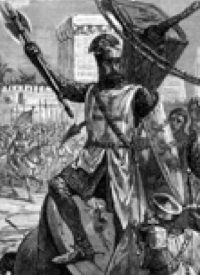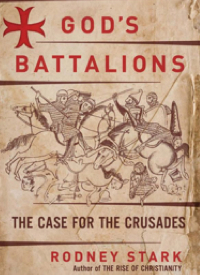
In God’s Battalions — The Case for the Crusades, Professor Rodney Stark is dedicated to the task of setting forth a popular history of the Crusades. He has little use for modern efforts to recast the Crusades as a justification for various barbaric acts undertaken by modern Muslims; in his words:
Current Muslim memories and anger about the Crusades are a twentieth-century creation, prompted in part by ‘post-World War I British and French imperialism and the post-World War II creation of the state of Israel.’ … Eventually, the image of the brutal, colonizing crusader proved to have such polemical power that it drowned out nearly everything else in the ideological lexicon of Muslim antagonism toward the West — except, of course, for Israel and paranoid tales about the worldwide Jewish conspiracy.
Stark realizes that most discussions of the Crusades in the media and academia have become reality-free zones; often the fact that Muslims had waged centuries of pitiless warfare in an effort to exterminate Christian civilization is simply elided in a swift motion, castigating the 11th-century leaders of Christendom for having the audacity to fight back. In Stark’s words:
Many critics of the Crusades would seem to suppose that after the Muslims had overrun a major portion of Christendom, they should have been ignored or forgiven; suggestions have been made about turning the other cheek. This outlook is certainly unrealistic and probably insincere. Not only had the Byzantines lost most of their empire; the enemy was at their gates. And the loss of Spain, Sicily, and southern Italy, as well as a hose of Mediterranean islands, was bitterly resented in Europe. Hence, as British historian Derek Lomax (1933–1992) explained, “The popes, like most Christians, believed war against the Muslims to be justified partly because the latter had usurped by force lands which once belongs to Christians and partly because they abused the Christians over whom they ruled and such Christian lands as they could raid for slaves, plunder and the joys of destruction.”
Establishing the historical context for the Crusades is crucial to Stark’s overall argument. Thus, several chapters of God’s Battalions are dedicated to the history of invasions and atrocities carried out in the name of Islam, and also to setting straight the historical record regarding the supposedly “advanced” civilization of Islam. Stark dismisses the oft-repeated fiction of “Muslim tolerance” of other “people of the book”:
A great deal of nonsense has been written about Muslim tolerance — that, in contrast to Christian brutality against Jews and heretics, Islam showed remarkable tolerance for conquered people, treated them with respect, and allowed them to pursue their faith without interference. This claim probably began with Voltaire, Gibbon, and other eighteenth-century writers who used it to cast the Catholic Church in the worst possible light. The truth about life under Muslim rule is quite different.…
In 705 the Muslim conquerors of Armenia assembled all the Christian nobles in a church and burned them to death. There were many similar episodes in addition to the indiscriminate slaughters of Christians noted earlier in discussions of the Muslim conquests. The first Muslim massacre of Jews occurred in Medina when Muhammad had all the local adult Jewish males (about seven hundred of them) beheaded after forcing them to dig their own graves. Unfortunately, massacres of Jews and Christians became increasingly common with the passage of time.
Stark is somewhat milder toward those who invoke the claim that Islam advanced the cause of scientific knowledge; the problem, he maintains, is that such claims are made in ignorance of the circumstances of Islamic dhimmitude: “What may have misled so many historians is that most contributors to ‘Arabic science’ were given Arabic names and their works were published in Arabic — that being the ‘official’ language of the land.” But Stark shows little interest in sparing the feelings of those possessed by political correctness when he turns his attention to the relationship between Muslim domination and cultural decline:
Islamic dhimmitude: “What may have misled so many historians is that most contributors to ‘Arabic science’ were given Arabic names and their works were published in Arabic — that being the ‘official’ language of the land.” But Stark shows little interest in sparing the feelings of those possessed by political correctness when he turns his attention to the relationship between Muslim domination and cultural decline:
Even many of the most partisan Muslim historians, including the famous English convert to Islam and translator of the Qur’an Marmaduke Pickthall (1875–1936), agree that the sophisticated Muslim culture originated with the conquered populations. But what has largely been ignored is that the decline of that culture and the inability of Muslims to keep up with the West occurred because Muslim or Arab culture was largely an illusion resting on a complex mix of dhimmi cultures, and as such, it was easily lost and always vulnerable to being repressed as heretical. Hence, when in the fourteenth century Muslims in the East stamped out nearly all religious nonconformity, Muslim backwardness came to the fore.
Against the common myths that the Crusades were intended to “convert Muslims,” or were a means of disposing of the unwanted sons of European nobles, Stark defends the thesis that the intention behind the Crusades was strategic, and that they were undertaken at great personal cost to the secular leaders of Europe with the intention of pushing back Islam’s military advance:
Although the Crusades were initiated by a plea from the pope, this had nothing to do with the hopes of converting Islam [sic.]. Nor were the Crusades organized and led by surplus sons, but by the heads of great families who were fully aware that the costs of crusading would far exceed the very modest material rewards that could be expected; most went at immense personal cost, some of them knowingly bankrupting themselves to go. Moreover, the crusader kingdoms that they established in the Holy Land, and that stood for nearly two centuries, were not colonies sustained by local exactions; rather, they required immense subsidies from Europe.
While apologists for Islam have repeatedly invoked the atrocities committed by crusaders, Stark notes that Muslim atrocities — some of the worst acts of human barbarism in the entire history of the period — are routinely ignored:
The second Muslim attack on Antioch [in 1268] burst through the walls. What followed was “the single greatest massacre of the entire crusading era” — a massacre that even shocked Muslim chroniclers. The gates were closed and guarded, and an orgy of torture, killing and desecration ensued….
Sad to say, it is no surprise that the massacre of Antioch is barely reported in many recent Western histories of the Crusades. Steven Runciman gave it eight lines, Hans Eberhard Mayer gave it one, and Christopher Tyerman, who devoted several pages to lurid details of the massacre of Jerusalem during the First Crusade, dismissed the massacre of Antioch in four words. Karen Armstrong devoted twelve words to reporting this massacre, which she then blamed on the crusaders since it was their dire threat that had created a “new Islam” with a “desperate determination to survive.”
God’s Battalions is not intended to serve as a comprehensive history of the Crusades; it is a scholarly introduction to the topic, written in a popular style that makes it readily accessible.
God’s Battalions — The Case for the Crusades (New York: HarperCollins, 2009). 276 pages. Paperback.



